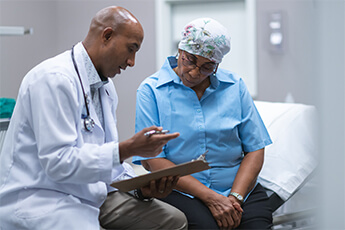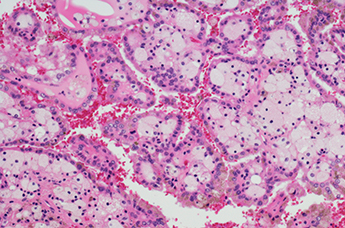When kidney cancer spreads to the lungs

Like any cancer, kidney cancer can spread outside of the kidney to other parts of the body. This is metastatic kidney cancer, also known as stage 4 or advanced kidney cancer. For up to 20% of people, kidney cancer has already spread by the time they find out they have cancer. Up to 40% of people experience cancer spread after getting kidney surgery (nephrectomy) to treat kidney cancer.
Kidney cancer, including renal cell carcinoma (the most common type), can spread to any part of the body, but it commonly affects the lungs. When this occurs, you have lung metastases, or lung mets.
From the community: “I have been battling this disease for 11 years. My first mets were found 11 months after the removal of my kidney. The only sure way to remove them and know that we got it all was with surgery. I had the one in the right lung removed and a month later the left tumor removed from that lung. Another 11 months later there was another met in the right lung. Because that second met was so close to the first one that the doc toook out my lower right lobe… I walk three miles a day and do Pilates twice a week. Having the surgeries have never kept me down and they won't.” – Inspire member

What are lung metastases (lung mets)?
Lung metastases, or lung mets, are a secondary form of cancer caused by the kidney cancer (the primary cancer). These secondary cancers occur when cancer cells break free from the original tumor in the kidney and circulate in the blood or lymphatic system. When the cancer cells settle in the lungs, they form new, secondary cancer tumors. These are lung mets.
Although these cancerous tumors affect the lungs, you don’t have lung cancer. You have metastatic kidney cancer in the lungs. Your oncologist (cancer doctor) will use kidney cancer treatments to treat these tumors — not lung cancer treatments.
What are the symptoms of lung mets?
Lung mets affect the respiratory system. Symptoms can mimic a cold or another respiratory infection. You should see your doctor if symptoms last for more than two weeks.
Common signs of lung metastases (lung mets) include:
chest pain
coughing up blood or mucus, or persistent cough
shortness of breath
wheezing or discomfort while breathing
weight loss due to lack of appetite
From the community: “I have had lung mets for about ten years. Most of the time I would not have known that they existed except that they showed up on the scans. Recently one of my lung mets has grown to the point where it is closing off one of the pulmonary airways. I could hear wheezing when I inhaled and now a portion of my right lung is collapsed. It does not cause any pain but the shortness of breath is noticeable and I have a dry cough most of the time.” – Inspire member
How are lung mets diagnosed?
At the time of the initial kidney cancer diagnosis, you’ll undergo tests to determine whether the cancer only affects a kidney, or if the cancer affects other parts of the body. This is called cancer staging. Staging helps your doctor choose the most effective treatments.
You may also get these tests if you have symptoms of lung mets or to check for cancer spread even if you aren’t having symptoms.
Tests for lung mets include:
CT scan
positron emission tomography (PET)
chest X-rays
From the community: “I had my left kidney taken out in March 2016,after that my scans showed nodules in my lungs, so far they are stable ,been getting scans every 3 monthes , last one he has changed me to come 6 monthes, this next time. so far they don't think its cancer. Haven't had chemo or anything. Keeping check on lung nodules.” – Inspire member
Could lung mets be lung cancer?
Yes, it’s possible that the tumors in the lungs are a primary lung cancer, and not kidney cancer that has spread to the lungs (lung mets). This distinction is important as the treatments for lung cancer and lung mets are different.
A 2017 study found that 3.5% of people receiving care at a particular cancer center for metastatic kidney cancer to the lungs actually had primary lung cancer, not lung mets. Smoking is a risk factor for kidney cancer and lung cancer, which can also complicate getting an accurate diagnosis.
To ensure the correct diagnosis and appropriately treat the lung tumors, your doctor may order these tests:
Sputum cytology: A doctor examines mucus coughed up from your lungs under a microscope for cancer cells.
Bronchoscopy: A doctor inserts a flexible, lighted tube called a bronchoscope down your throat and into the lungs to examine lung tissue. The doctor may remove samples of lung tissue to examine for cancer cells.
Lung needle biopsy: A doctor inserts a needle through your numbed skin and into the lung to remove lung tissue to examine for cancer cells.
Surgery: A doctor surgically removes the tumor and then biopsies it for cancer cells.
How are lung mets treated?
Treatments for lung mets include:
chemotherapy, drugs that circulate in the blood, targeting cancer cells throughout the body
immunotherapy to boost your immune system, helping it to destroy cancer cells in the kidney and lung
radiation therapy to shrink the lung tumor
In rare instances, doctors perform surgery to remove the lung tumor. Surgery only occurs if the primary kidney cancer is under control and the cancer spread only affects one lung.
You can also talk to your doctor about participating in a clinical trial to try new therapies still in development.
From the community: “My husband had a nephrectomy for RCC almost 6 years ago. At that time he had many small lung mets, as well as some in other areas. He has been on 3 treatments, most recently Opdivo for 14 months. There has been some growth in the mets so he will be considering other options, probably a trial with another agent added to Opdivo. The lung mets cause him some coughing and wheezing, but it comes and goes. My brother had small cell lung cancer and had no wheezing or coughing once it was treated with radiation. I think the important thing is to realize that there is very effective treatment out there to control your cancer and it's symptoms. It takes courage to go through all the treatments, but they can be very successful.” – Inspire member
What are other treatments for lung mets?
Lung mets symptoms like chest pain and shortness of breath can be difficult to live with. Your doctor may prescribe pain medicines or anti-anxiety drugs to ease symptoms.
If you didn’t use palliative care after your initial kidney cancer diagnosis, you may want to look into the option now. Unlike hospice, which provides services for the end of life, palliative care specialists help people with chronic illnesses manage symptoms to improve quality of life. Research suggests that palliative care may help you live longer.
What are complications of lung mets?
Lung mets can cause fluid to accumulate around the lungs. This condition, pleural effusion, prevents the lungs from taking in enough air. As a result, you constantly feel short of breath. To improve your breathing, your doctor may prescribe antibiotics and perform a procedure called thoracentesis, which drains the fluid from around the lungs using a small tube. You may need this procedure more than once.
What is the outlook for people with metastatic kidney cancer?
Many factors influence survival rates for metastatic kidney cancer. The prognosis for people with lung mets is improving. It’s estimated that 1 in 14 Americans with metastatic kidney cancer live at least five years after receiving the diagnosis. Some people live much longer.
Sources
Lung metastases. American Cancer Society. September 2020.
Tests for lung cancer. American Cancer Society. June 2021.
What is kidney cancer? American Cancer Society. May 2020.
Kidney cancer: Types of treatment. American Society of Clinical Oncology. October 2020.
Lung metastasis: Symptoms and diagnosis. BreastCancer.org. June 2019.
Meacci E, et al. Lung metastasectomy following kidney tumors: Outcomes and prognostic factors from a single-center experience. Journal of Thoracic Disease. October 2017.
Cancer stat facts: Kidney and renal pelvis cancer. National Cancer Institute.
Parikh RB, et al. Early specialty palliative care: Translating data in oncology into practice. New England Journal of Medicine. December 2013.
Lung cancer may go undetected in kidney cancer patients. UT Southwestern Medical Center. March 2017.
Disclaimer
Member comments are lightly edited for length and to remove identifying information but are otherwise reproduced as they appear in the community as part of public posts.
This content is for general informational purposes only and does not necessarily reflect the views and opinions of any organization or individual. The content should not be used as a substitute for professional medical advice, diagnosis, or treatment. Please consult your healthcare provider about any questions you may have regarding a medical condition.




